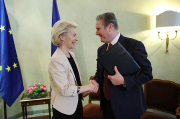
The BBC allegedly violated its editorial guidelines 1,553 times over a four-month period starting on October 7, 2023, according to a new report.
The analysis, reported by The Telegraph, accuses the broadcaster of consistently downplaying Hamas terrorism while presenting Israel as militaristic and aggressive.
The report, led by British lawyer Trevor Asserson, head of Israel’s largest international law firm Asserson Law Offices, and a long-time critic of BBC bias, outlines a "worrying pattern of bias" and multiple breaches of the BBC's editorial rules on impartiality, fairness, and truthfulness.
Asserson's newly launched organization, Campaign for Media Standards, aimed at exposing media bias in the UK, conducted the research. A team of around 20 lawyers and data scientists used artificial intelligence to analyze nine million words of BBC content. The report highlights that some BBC journalists who covered the Israel-Hamas war had previously expressed sympathy for Hamas or celebrated its terrorism.
The report also criticized the BBC’s portrayal of war crimes, stating that Hamas’ actions, including hostage-taking, murder, and torture, were not given due prominence. Instead, Israel was more frequently associated with accusations of war crimes, genocide, and breaches of international law than Hamas.
Particularly concerning was the performance of BBC Arabic, described as one of the most biased international media outlets covering the Gaza conflict. The report noted 11 instances where BBC Arabic featured reporters who had publicly supported terrorism or Hamas.
The findings have drawn sharp criticism, with former BBC executive Danny Cohen calling for an independent inquiry into the network’s coverage of the Gaza war. Organizations such as the Campaign Against Antisemitism and the National Jewish Assembly have echoed these demands.
Conservative Party figures, including Sir Oliver Dowden, have also raised concerns about the BBC’s declining standards, urging it to adhere to its editorial guidelines and ensure fair, unbiased reporting. The BBC has faced backlash since the October 7 massacre for avoiding the term "terrorist" in reference to Hamas, only recently agreeing to label it a "proscribed terrorist organization."
In response, the BBC said it would “carefully consider” the report but questioned the methodology, particularly the reliance on AI to assess impartiality. The corporation rejected allegations that its reporters celebrated acts of terror and emphasized the importance of context in its coverage. The BBC stated it aims to achieve due impartiality rather than a "balance of sympathy."
Critics, such as Lord Ian Austin and Lord Stuart Polak, argue that the BBC has consistently failed to meet the standards of impartiality expected of a publicly funded broadcaster. Austin, a former Labour Party minister, expressed deep disappointment in the BBC's response to ongoing criticisms, saying he is now convinced that its coverage of the conflict fails to meet required impartiality standards. Photo by Chmee2, Wikimedia commons.









































